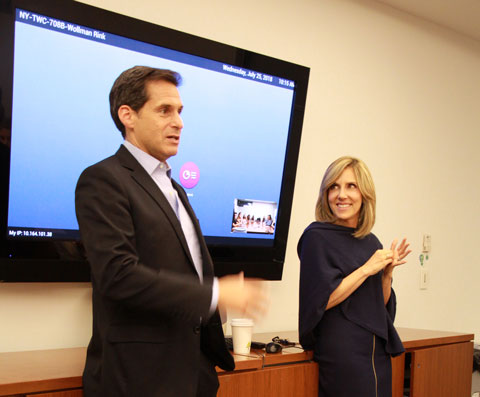INTERVIEW - August, 2018
CNN
FastForward Interviews CNN's John Berman and Alisyn Camerota
WRITERS: CC Clark, Sabine Lloyd, Lily Baldwin (Campbell Slavin University High, Drew and Redwood High Schools)
REPORTERS: Kyle Austin, Kylar Flynn, Gigi Gonzalez, Simone Harper, Brandon Lopez, Jacqui Martin, Claire Mckechnie, Lauren Mckechnie, Samantha Michaels, Joshua Santos, Anna Silverman, Lilli Wanninger

An earthquake and tsunami hit Indonesia, killing 2,000 people. ~ An 8-year-old girl discovers a 1,500-year-old Viking sword in a Swedish lake. ~ Nine people die in Peru after eating contaminated food. ~ Refugees live in tents as they wait and hope they’ll be allowed to enter a new country. ~ A company has developed a new transit capsule that will get you from San Francisco to Los Angeles in 26 minutes. Who is going to tell these stories?
CNN, of course.
Ever since Ted Turner launched the nation’s first 24-hour, all-news television channel in 1980, Cable News Network (CNN) has made it its business to deliver in-depth, on-the-spot broadcast journalism from around the globe, earning many honors and awards in the process.
From the Gulf War to 9/11 to Hurricane Katrina to the 2016 presidential election, CNN has been on the ground, often before anyone else, telling the story to millions of people in over 200 countries via digital device, radio and old-school TV.
CNN’s New York bureau is located in the Time Warner Center, a gleaming, new 55-story twin-tower complex in midtown Manhattan with a stunning lobby and atrium. We were there to interview John Berman and Alisyn Camerota, the anchors of CNN’s 6–9 a.m. morning program, New Day.
 The pair greeted us with the buzzed yet relaxed attitude of two people who’d just spent three hours on live television and were slipping into the more laid-back part of their day. As soon as they began speaking, it was clear why they were teamed up for this show. They have an incredible between friends and making us feel like they were performing a little New Day just for us.
The pair greeted us with the buzzed yet relaxed attitude of two people who’d just spent three hours on live television and were slipping into the more laid-back part of their day. As soon as they began speaking, it was clear why they were teamed up for this show. They have an incredible between friends and making us feel like they were performing a little New Day just for us.
New Day is a straight news show without much banter (although the hosts’ chemistry doesn’t hurt). You’ll find none of the fluff associated with other morning shows—no cooking segments, no cuddly animals. As Berman put it, it’s their way of introducing viewers to what they’ll need to know for the coming day.
Working on a show with a 6 a.m. live broadcast requires an abnormal work schedule. Camerota wakes up at 3:15 each morning and is out the door and on her way to work by 3:45. Her 3:45-to-4:45 commute is the busiest hour of her day because that’s when she and her producer (who’s already been at work for three hours) email back and forth, going over transcripts, reading articles, finding videotapes and meticulously fact-checking. She arrives at Time Warner at 4:45, goes up to her office, changes out of her pajamas and into the dress she’ll wear on the air and pops into Berman’s office to let him know what she’ll be wearing so he can choose an outfit to complement it. Next stop is hair and makeup until 5:30, then breakfast—which, Camerota admits, is usually anything she can find lying around the office—while she reads through her notes and mentally prepares herself for the show to come. At 5:45 she heads to the set to work out some of the show’s technical aspects and help prepare a voiceover or two. Finally, at 6, they go on the air. At 9, it’s over. Day done, Camerota goes to her office, takes a quick nap on her couch and heads home, where she spends the rest of the day with her three children.
What’s a typical day in Berman’s life? “Almost exactly the same except no dresses.” After the show’s over he works out at a gym, then returns to the office to do a bit more work—though he admits that in late morning there isn’t much to do to prepare for the next day’s show because nobody knows what the news is going to be. So around 11 a.m. Berman heads home and spends the afternoon with his twin 11-year-old sons. After dinner he does deep research for the next day’s show so when he wakes up he’ll be better prepared for the morning chaos.
Every single morning I’m willing to be convinced…I’m willing to have any of my guests, and I don’t care if they’re Democrats or Republicans or Independents or male or female or old or young, I’m willing to have them show me a new perspective, one that I hadn’t considered. Because I think that we all go into things with bias. We all go into things with preconceived notions. But you’re a really good journalist if you don’t cling to those notions.
The nature of Berman and Camerota’s work—the news—is that it’s constantly evolving in a way that’s nearly impossible to keep up with, especially nowadays, and especially for the people responsible for delivering it. Broadcast plans often must be scrapped to make room for overnight or early-morning breaking news.
This day provided an example: The night before, CNN’s Chris Cuomo had obtained audiotapes of conversations between Donald Trump and his then-attorney Michael Cohen, who had been secretly taping Trump for years, and that morning, while New Day was on the air, Trump commented on the tapes and the show itself.
It’s a job requiring alertness, quick thinking and a sharp intellect. You’re constantly on your toes. “The three hours of live news, there’s nothing like it,” said Berman. “It’s sort of like a carnival for your senses at all times. And if you like reporting and you like information, it’s really wonderful to be in the middle of it all here at CNN because it’s all happening all around you.”
We’re living at a time when fact-checking and reporting the truth are more important than ever. “It’s everything,” agreed Berman. The best way to arrive at it? “By trusting your sources, knowing your sources…reading as much as you possibly can about something that happened, watching with your own eyes and listening with your own ears.” Camerota agreed that the only sources she truly trusts are her own eyes and ears, mentioning that as she was preparing for a show a few days earlier, she asked a contributor if White House Press Secretary Sarah Huckabee Sanders ever used the term “fake news.” He told her that he thought she had—which, of course, wasn’t good enough—and that a credible newspaper reported that she had—which wasn’t good enough for her, either. Camerota and her producer spent an entire hour researching this one fact and eventually found a transcript from 2017 in which Sanders used the term. But it wasn’t until Camerota searched for and obtained the videotape and heard Sanders actually utter the two words that she was satisfied.
Berman quoted Carl Bernstein, the legendary journalist who helped break the Watergate story and who is now a contributor at CNN: that journalism is “the best obtainable version of the truth.” “That’s what he always works for, which is to say you’re always looking for the most information you can find, the most pure version of it. Sometimes it’s imperfect. It will change and things come into it. But that’s what the goal is, is the best obtainable version of the truth.”
The three hours of live news, there’s nothing like it… It’s sort of like a carnival for your senses at all times.
What advice would you offer aspiring journalists? Always ask, “Why?” Berman said, adding that “insatiable curiosity is your best friend.” Start with people you spend your day-to-day lives with—your families, teachers, friends. When they offer an opinion, ask them why—that’s how you get to the heart of the real answer. You’ll be surprised at how their words change upon reflection.
Camerota told us to always keep an open mind. “Every single morning I’m willing to be convinced…I’m willing to have any of my guests, and I don’t care if they’re Democrats or Republicans or Independents or male or female or old or young, I’m willing to have them show me a new perspective, one that I hadn’t considered. Because I think that we all go into things with bias. We all go into things with preconceived notions. But you’re a really good journalist if you don’t cling to those notions…Now, they have to be fact-based. I’m not saying go in and be gullible and let somebody sway you. But be open that you might not know everything and that you might be able to learn something every day. I am hoping to learn something every day, and every day I do.”
